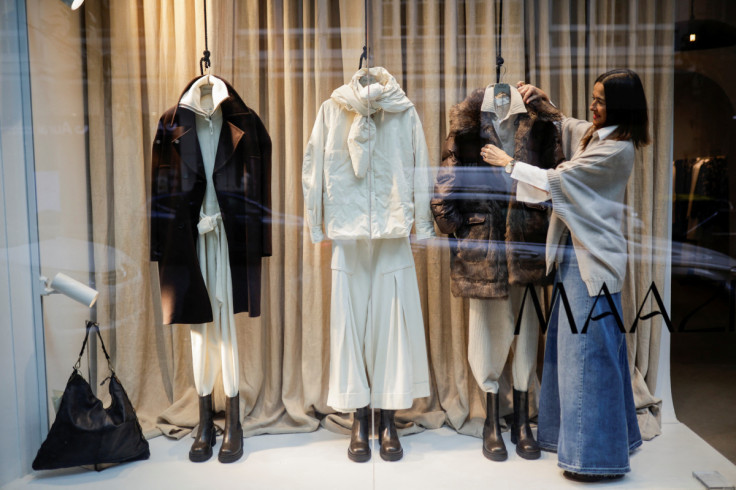How AI is being used to revolutionise fashion for retail and luxury brands
Within an ever developing industry, Fashions use of AI and technology to innovate has reached a new high, redefining the boundaries of creation.

The meta-verse has become the fashion industry's buzzword, with designers and brands alike recognising the power of technology in making their own unique mark on the clothes they produce. This speaks to a new era in a world that values individuality above all else, with the likes of generative art clearly detailing the future of fashion.
Starting in 2022, the epidemic of digital environments introduced a new wave of creativity that allowed artists within the trade to tackle the traditional forms of business and creation within fashion, and instead innovate to introduce new potentials in wearable technology.
The developments of this breakthrough were seen in April at Soho's Spring Studios, where they debuted the first fashion week solely produced by AI, pushing the boundaries by illustrating the outreach of tech.
Despite these advancements, there has been some doubt about the practicality of this in the real world, with some arguments suggesting that the use of AI in fashion raises ethical concerns regarding privacy, security, and the potential perpetuation of biases in areas such as sizing, body image, and representation.
This may foster the failure to deliver accurate suggestions and thus become overly intrusive to the customer. Furthermore, looking globally and its impact on other businesses, whilst AI has the potential to optimise supply chains and improve efficiency, its use in fashion can also contribute to increased consumption and environmental impact, impacting sustainability efforts.
AIFW Top 10 Designer, Gaby Roses, spoke about the power of AI stating that we "not to be afraid of AI but rather to embrace it as a tool to amplify the amazing things that humans can do" and rather think of the potential of the tool, which we can use to "enhance and expand the creative process, while still valuing the human touch that is essential to couture".
Regardless of these concerns raised the monetary value behind the market of it seems to be steamrolling ahead, with an estimated growth of 36.9 per cent by 2027, reaching $4.4 billion.
Market Reach of Fashion Technology
These first steps at events such as AIFW spoke to retailers about the potential behind using AI as a driving force to expand the markets of fashion, allowing them to reach a new audience that was previously unavailable due to limitations in technology. This, however, is because they are now able to revolutionise how customers are interacting with the merchandise online, with the ability to recommend and amend products that are best suited for the customer, further closing the gap between Retail and E-tail.
Early stages of this process can be seen enacted in retailers such as Specsavers adopting technological personalisation, most notably in their virtual try-on technology which has become increasingly popular in the eyewear market, with its implementation being seen across most popular retailers, showing the trend of AI, whether it be garments or eyewear has no signs of slowing down.
However, AI has not been the sole driver within this new space, and the rise of digital art has also been expressed and embraced in the emergence of Non-Fungible Tokens (NFTs) with the market set to soar to a whopping $231 billion by 2030.
Retailers and Luxury brands alike have swiftly embraced the strategic utilisation of NFTs to transform their customer interactions, bolster their brand equity, and tap into emerging revenue streams. NFTs present an unprecedented opportunity to market and monetise exclusive and limited-edition fashion items within the digital landscape.
For example, the launch of French luxury fashion brand YSL's exclusive NFT collection, 'YSL Beauty Night Masters', has started to bridge the gap between the physical and digital realms, allowing retailers to leverage NFTs as a catalyst for transformative growth, expanding their market reach and captivating customers with cutting-edge and experiential encounters.
On the whole, nonetheless, it is clear that the fashion industry is undergoing a significant transformation with the integration of AI and digital technologies. Despite ethical concerns regarding privacy, security, biases, and environmental impact, designers and brands recognise the potential of AI to amplify human creativity and enhance the design process. The market value of AI in fashion is projected to grow substantially, indicating a strong demand for technological advancements,
This shift in consumer behaviour is driving innovation in the industry, with designers and brands embracing the trend towards technological advancements. Its use is fundamentally changing the fashion world in exciting and meaningful ways, and with the rise of social media and the focus on individuality, the trend towards personalisation is set to continue its upward trajectory.
The fashion industry is not just adapting to this trend, but leading the charge towards a more sustainable and meaningful future.
© Copyright IBTimes 2025. All rights reserved.





















